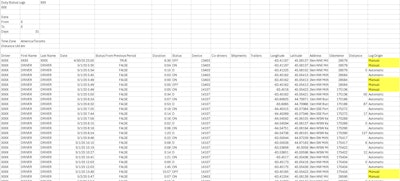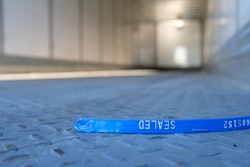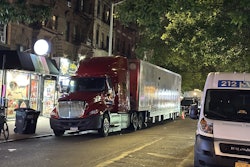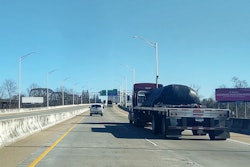9/16 Update: This article was updated to remove mentions of PDF file formats, as they're only used in Canada, and correct some of the discussion around which HOS violations can result in a driver being put out-of-service.
As ELD service providers cold-call trucking companies advertising ways to hide clear hours of service violations, a simple fix to the problem could be hidden in plain sight for roadside inspectors.
That's according to Jill McBeth of Raven Transportation Safety Consulting, a company that helps motor carriers comply with HOS regs. McBeth has seen firsthand acts of ELD deception and lays the blame on non-compliant ELD service providers.
Drivers know that ELDs connect to the truck's computer and automatically record events like driving time and stops. Drivers and fleets can edit ELD logs, like when a driver forgets to record lunch or a coffee break as off-duty time, with the driver required to approve any back-office edit, but lately a new type of ELD editing has emerged.
Overdrive reporting revealed that the Commercial Vehicle Safety Alliance, the multinational org charged with coming up with consistent, clear and uniform inspection protocols and the annually updated out-of-service criteria, has seen an uptick in suspiciously perfect ELD logs.

"What inspectors are finding with increased frequency are records of duty status (RODS) that are being completely altered with no indication they were edited at all," said Jeremy Disbrow, CVSA's Roadside Inspections Specialist. That's contrary to what's required of ELDs -- if edits like those mentioned above are being made, the device by regulation is required to preserve those edits, and it's a best practice for operators to annotate their records to explain edits to avoid roadside hassle.
[Related: ELD tampering: CVSA drafts new inspection bulletin to combat 'dangerous trend']
But according to McBeth, the new type of masked alteration Disbrow noted inspectors are seeing does still leave behind indications of the edits, and if inspectors really cared to find them, they could.
Inspectors typically ask drivers to "send seven days of RODs" -- that is, a seven-day logs history, she said. "And they have criteria in the technical standard for ELDs on how the devices must be able to transmit data."
Overdrive spoke to a former inspector and CDL trainer who said most often these days, drivers transmit the HOS data via Bluetooth, a web service, or another method of digital transfer.
Those files will show any edits made to the log that the driver or carrier will then have to explain -- if drivers are annotating their status changes or edits within the log, the transmitted record itself will help explain it. (For example: I forgot to switch into sleeper berth after parking.)
[Related: ELD annotations to avoid hours of service violations]
The new phenomenon of illegally edited ELDs doesn't show any edits at all, but perfect adherence to the hours of service in the transmitted record.
Yet "every single device, if compliant, is programed to generate a CSV report that is identical" in structure with the same layout and headings as any other compliant device, said McBeth, referring to a "Comma Separated Values" file type that's commonly used in spreadsheets like those produced in Microsoft Excel.
 This sample of a CSV file from a non-compliant ELD shows that some of the driving time has been manually edited. It's not easy to read, but to the trained eye, these type of edits jump out as needing further investigation, McBeth said.
This sample of a CSV file from a non-compliant ELD shows that some of the driving time has been manually edited. It's not easy to read, but to the trained eye, these type of edits jump out as needing further investigation, McBeth said.
The spreadsheets are required to conform to the technical standard outlined in the Code of Federal Regulations 395 subpart B section 4.8.2.1, which lays out in detail the columns, headings, and data that needs recording for an ELD to comply with the law.
Digging into the CSV file gets a little technical. McBeth shared with Overdrive sample CSV files from ELDs and pointed to a column that says if driving time was automatically recorded or not.
"You can look at this spreadsheet and in five seconds tell if that device is compliant or not compliant," she said. Basically, the spreadsheet will show that driving time was manually edited, whereas the technical standard states an "ELD must not allow automatically recorded driving time to be shortened" unless under specific circumstances.
Hope Trans, the fleet behind the tragic Terrell, Texas, crash that killed five in June, had a long history of HOS violations, including stops with drivers that had no ELDs active. How could a company like that pass a DOT audit?
One former Hope Trans driver told local news outlet WFAA that "the company regularly altered shipping records to hide the true number of hours they had been driving."
How exactly a non-compliant ELD company hides log edits isn't exactly clear to McBeth, but she strongly suspects that "data manipulation is happening on a provider level. The provider that builds the app and sells it -- they’re the ones doing the manipulation."
Now, according to McBeth, inspectors are seeing suspiciously "perfect" driving logs at inspections.
"I’ve spoken to the other investigators in U.S. and Canada, and the reason [the ELD editing] gets flagged is that it's way too perfect. There is no driver in the world that drives exactly 10 hours a day."
This lines up with what Disbrow said previously:
"In many instances, the ELD entries that are shown to inspectors are inaccurate by hundreds or thousands of miles when compared to verified source documents, such as shipping papers, scale receipts, etc. When entire days or multiple days are completely falsified by manipulating the ELD data, inspectors have no way to identify when the driver was actually driving or resting, making it impossible to determine whether they have their required rest or available driving time."
Of course, roadside inspectors mostly just check that the driver's ELD shows compliance with the HOS. They do not, typically, check that the ELD complies with the technical standard. But McBeth said that with ELD providers themselves providing on-demand HOS cleanup, "roadside inspections are the key" to halting cheats among providers and fleets before the records can be falsified.
Dispatcher Hector Adrien Esquivel Rodriguez recorded a call with a company called Logbook Hub that advertises on Facebook that it can "FIX your logbook" for $30 a week. Rodriguez posted a video to YouTube that featured the company telling him they only need drivers to call or text Logbook Hub, which works with several ELD providers to have driving time added to the books. The Logbook Hub representative described the company editing logs "24/7, no holidays" and manually manipulating driving time and distances.
"If you had a section of the road where you drove 30 miles," the service can edit the log "squeezing that driving time, we’ll make it for example 55," the representative said.
This is the kind of log manipulation McBeth said the CSV files will show if inspectors look beyond basic HOS compliance for drivers and into the compliance of the device itself.
While CVSA plans a new OOS violation for this behavior, Overdrive asked if it intended to start checking the CSV files and did not hear back.
FMCSA also did not respond to Overdrive request for comment on the matter in time for publication.











